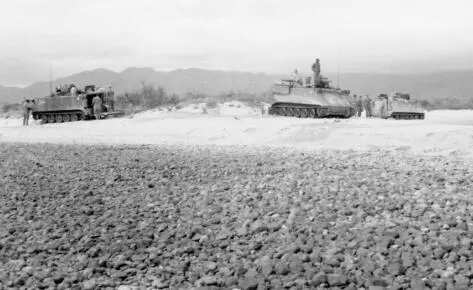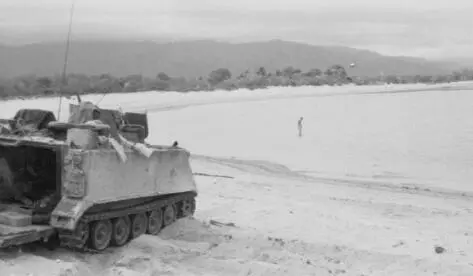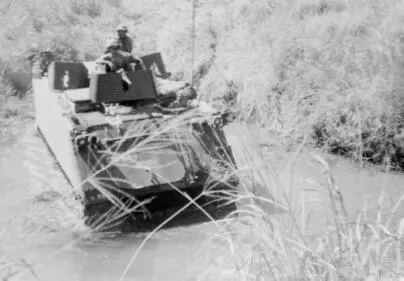I had my little war wound — that was now beginning to throb. And, now we were safe, John pulled on his one-sleeved shirt, righted the Super Cub and declared his intent to drive on to Vinh Hoa.
‘Are you completely insane?’ I yelled at him.



APCs by the parched lake. Highway 22, Saigon, 1968.
He hugged me, kissed me quickly on the lips to halt my protestations and said, ‘I’ll be back tonight. I’ll come to your place. I’ll bring Queenie.’
‘No, John, don’t go,’ I said, angrily and grabbed his arm. But I released it when I saw the look in his eye. Mad, unreachable.
‘I don’t advise it, sir,’ the lieutenant commanding the APC squadron said, dryly.
‘I’m a journalist,’ John said. ‘I’ll be safe. Don’t worry.’
‘Oh yeah. One of those fuckin’ crazy journalists. You’ll be fine, man. Go for it.’
His men laughed.
John climbed on to his bike, started it, smiled, gave me a thumbs-up and motored off down the road, flinging out a final wave as he dwindled away into the wobbling heat haze.
I waited in for him that night, but he never came. The next day he was posted as missing in action — villagers in Vinh Hoa said he’d been taken prisoner by a cadre of retreating Viet Cong, no doubt the ones who’d fired at us from the roadside shack. I wasn’t too worried: journalists were quite frequently captured but usually well treated and released after a few days, the reasoning being that they would speak favourably about their captors — good propaganda.
A week went by, and there was no sign of John Oberkamp and his Honda Super Cub.
Two weeks later I had a letter from his mother, Mrs Grace Oberkamp, from Sydney. John had written to her about her forthcoming grandchild and had given her my address, for some reason. It seemed to me a strange precaution, as if he had a prescient worry about what might happen to him. I was suffering from retrospective worry, also, recalling that moment alone on Highway 22 just before the shooting started. If those VC had been better shots I would have been cut down there and then, I was now realising. Annie and Blythe orphaned. I felt sick — genuinely shaken up — but these thoughts and images haunted me in the days after John disappeared. I could close my eyes and see myself fall, feel the bullets hit.
Mrs Oberkamp said that in his letter John had been concerned about his possessions and that if anything happened to him she was to contact me. Would I be so good as to gather up his bits and pieces and post them on to her? She would be eternally grateful and would reimburse me for all expenses incurred.
And just at that moment the first copy of my book arrived. Vietnam, Mon Amour (Frankel & Silverman, 1968). I knew the title wasn’t original but it served my non-combat photos admirably. Moreover, its appearance caused something of a stir in the press corps. A good number of the photographers working in Vietnam had books planned, I knew — we often discussed them — but I was one of the first to be published, beaten only by Jerry Strickland of UPI and Yolande Joubert of Paris Match. Even Renata Alabama looked at me with new respectful eyes, asking if I could put a word in for her with Frankel & Silverman. I should have savoured the acclaim — and the overt envy — but I was suddenly aware that whatever ‘ amour ’ there had been between me and Vietnam was swiftly diminishing.
I kept thinking — and, what was worse, dreaming — about that moment when I’d stood alone in the middle of Highway 22, south of Vinh Hoa, in the eerie stillness, apart from the distant drone of the Spooky gunship doing its pylon turn. It stayed in my head like a film loop, a scene from an unfinished movie. I had my three-inch bullet graze, nicely scabbed, now, and I had my shiny new book with its glossy photos. I was aware of my good luck, the good fortune, that had led me to this position. But I knew I wanted to go home — to Scotland, to Barrandale.
However, there was a last task to be done, a final deliverance of duty to John Oberkamp. I managed to hitch a ride on a Royal Australian Air Force Hercules that was making the short hop from Saigon to Nui Dat where I showed Mrs Oberkamp’s letter to the base’s senior PEO.
‘Oh, yeah, Oberkamp,’ he said. ‘Any news?’
There was no news, I said.
He drove me out to John’s sandbagged hooch near the perimeter by the main runway and showed me in. He said he’d be back in thirty minutes to pick me up. Inside there was a metal bed with a Dunlopillo mattress, some half-drunk bottles of rum and bourbon, about a thousand cigarettes, an electric fan and a gunny sack filled with dirty clothes. Under the bed was a cardboard box that contained a dozen paperbacks, two cameras and John’s trademark bush hat with its cryptic slogan — ‘BORN TO BE BORN’ — painted on the front in coral-pink nail varnish. Pinned to the wall above the bed, I was pleased to see, was one of my ‘Never Too Young To. .’ T-shirts. That was it — he travelled light, did John; this was small cargo for a man who’d been in Vietnam since 1965. I dumped the dirty clothes on the bed and filled the gunny sack with the books and cameras and anything else personal that I could find (two Zippo lighters, an ashtray from the Hilton Hotel in Tokyo, a few rolls of undeveloped film). I kept the bush hat for myself and pulled it on my head, tucking my hair in under it.
I decided not to wait for the PEO and so set off, strolling back towards the control tower and the administrative buildings, John’s gunny bag over my shoulder. It was mid-afternoon and the sun was burning through the milky sky, a blurry, brassy disk. I smelt rain coming.
I heard the chugging clatter of helicopter engines and paused to see a couple of RAAF Hueys coming in low over the perimeter fence to dust down next to a waiting ambulance with medics standing ready by a gurney with a drip rigged, waiting for some casualties. I wandered over.
The Hueys landed, the rotors stopped and the men inside began wearily to disembark. The medics ran forward and carried two body bags into the ambulance before returning with the gurney for another soldier, seemingly unconscious, both legs bandaged from ankle to thigh. A jeep pulled up by the ambulance and a senior officer stepped out. He talked to the medics as they carefully loaded their grim freight of suffering humanity on board the ambulance. I saw him touch the shoulder of the wounded man.
I was close to the disembarked soldiers now — some standing, some sitting on the ground, all of them smoking — and I recognised that air of filthy, blank exhaustion about them that comes upon soldiers after hours of combat, of being under fire. I’d seen it before — most notably at Wesel in 1945 — and once seen, never forgotten. Their clothes were damp and dirt-ingrained, the green cotton drill dark and blackened from the grime and sweat. They carried an assortment of weapons — FN rifles, M16s — I even saw one man with an AK-47 — enough to tell me that these men were not regular Australian Army; this must be the Australian SAS — the SAS Regiment, as it was known. John had told me that units were based here at Nui Dat from time to time. I edged closer — mechanics were checking the Hueys, and a petrol tender had rolled up so there was a fair bit of distracting activity going on — and I could see a couple of two-ton trucks heading out to pick the unit up.
Читать дальше















